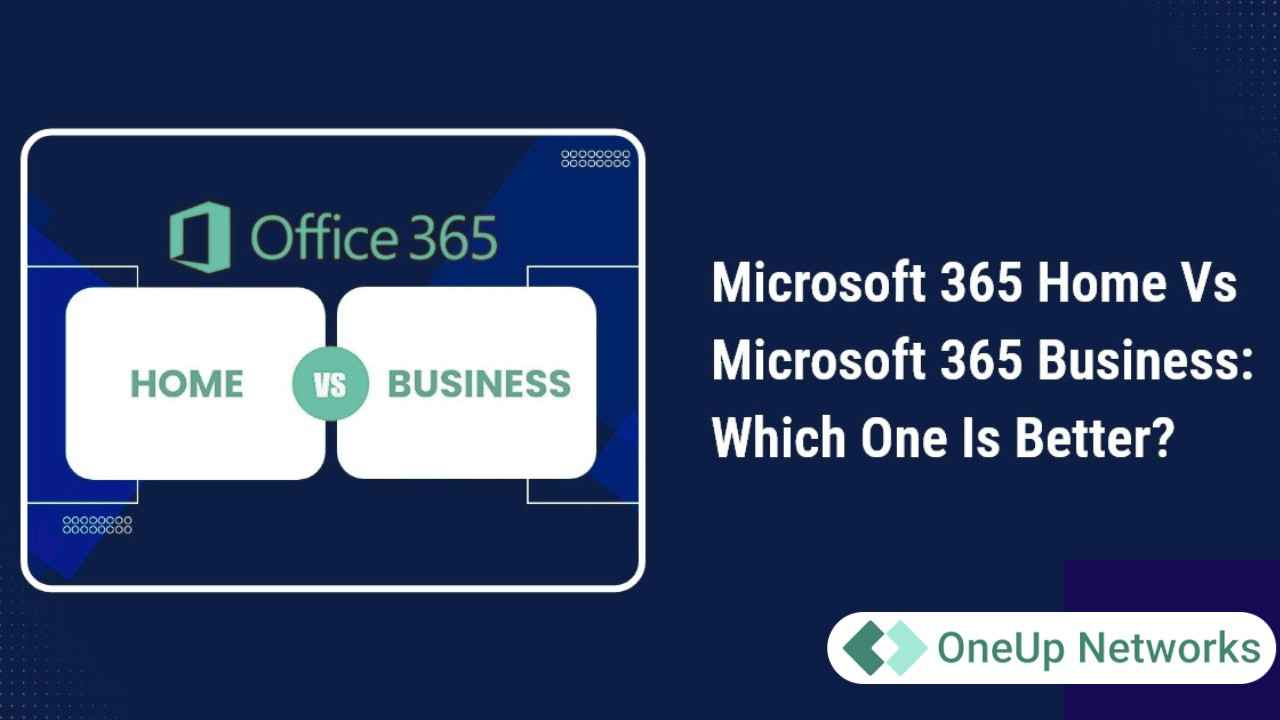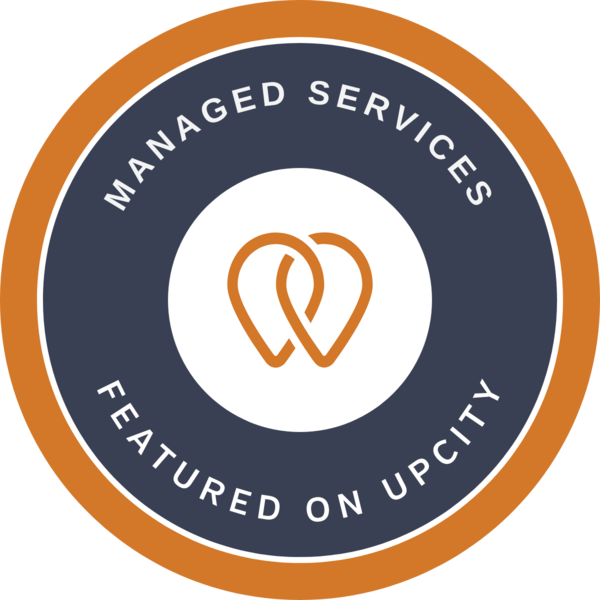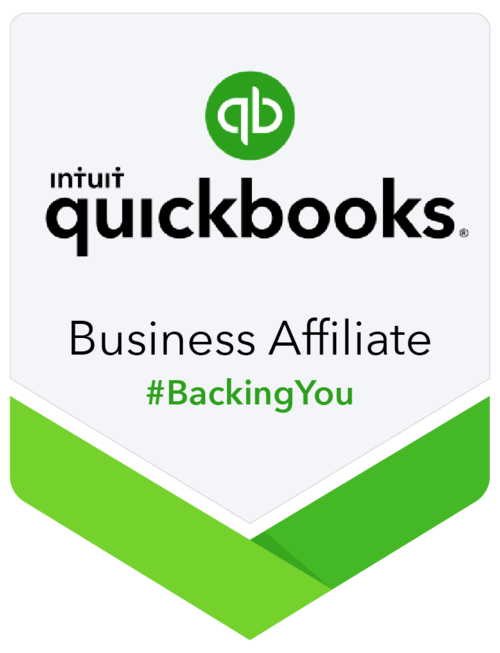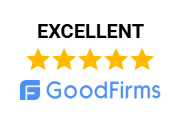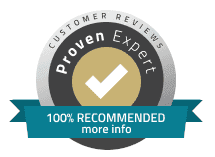Choosing the right Microsoft 365 plan is no longer just about getting Word and Excel. Your choice between Office 365 Home vs Business determines how you collaborate, manage data, and secure your digital workflow. In this in-depth guide, we break down the differences between Microsoft 365 Home (Personal/Family) and Business (Standard/Premium) with real-world examples, pricing, and buying advice tailored for families, freelancers, and small businesses.
What is Microsoft 365?
Microsoft rebranded Office 365 as Microsoft 365 in 2020. Despite the name change, the plans remain divided into three core categories:
- Home/Personal plans → Designed for individuals and families who want affordable, consumer-focused productivity tools.
- Business plans → Tailored for small and medium-sized businesses (SMBs), with professional email, business-grade Teams, and extra security.
- Enterprise plans (E3, E5) → Advanced security, scalability, and compliance for large organizations.
What is Office 365 Home?
Previously called Office 365 Home, this subscription is now available as:
- Microsoft 365 Personal (1 user)
- Microsoft 365 Family (up to 6 users)
Key Features
- Access to Word, Excel, PowerPoint, Outlook, OneNote
- 1 TB of OneDrive storage per person
- Multiple devices per user (PC, Mac, iOS, Android)
- Microsoft Teams (consumer features, not enterprise-grade)
- Ad-free Outlook.com email
Pricing (as of 2025)
- Microsoft 365 Personal: $69.99/year (1 user)
- Microsoft 365 Family: $99.99/year (up to 6 users)
(Note: Prices may change; always confirm on Microsoft’s official website.)
Best For
- Students
- Households and families
- Freelancers who don’t need business-class collaboration or email hosting
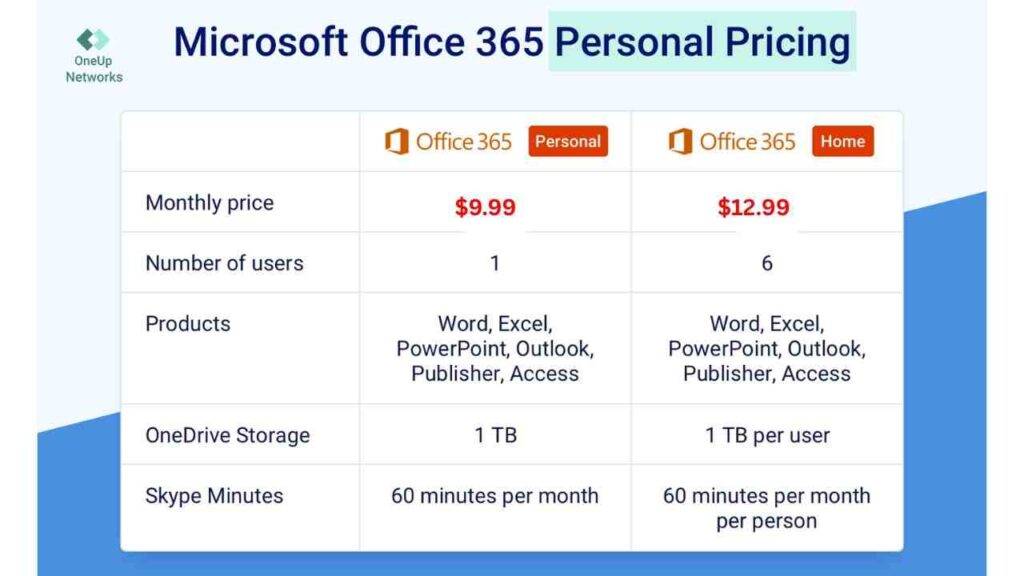
What is Office 365 Business?
Business editions are designed for professional use. They include advanced collaboration apps, business-class email, and higher security controls.
Microsoft 365 Business Standard
- Desktop apps: Word, Excel, PowerPoint, Outlook, Access, Publisher
- Professional email with Exchange ([email protected])
- Microsoft Teams (business version with video, chat, and collaboration)
- SharePoint for file libraries and intranets
- 1 TB OneDrive for Business storage per user
- Price: $12.50 per user/month (annual commitment)
Microsoft 365 Business Premium
- Everything in Business Standard
- Enhanced security & device management with Microsoft Intune and Azure AD
- Advanced threat protection and compliance options
- Price: $22 per user/month (annual commitment)
Best For
- Small and medium-sized businesses
- Startups scaling their workforce
- Professional firms requiring secure collaboration (accounting, law, healthcare)
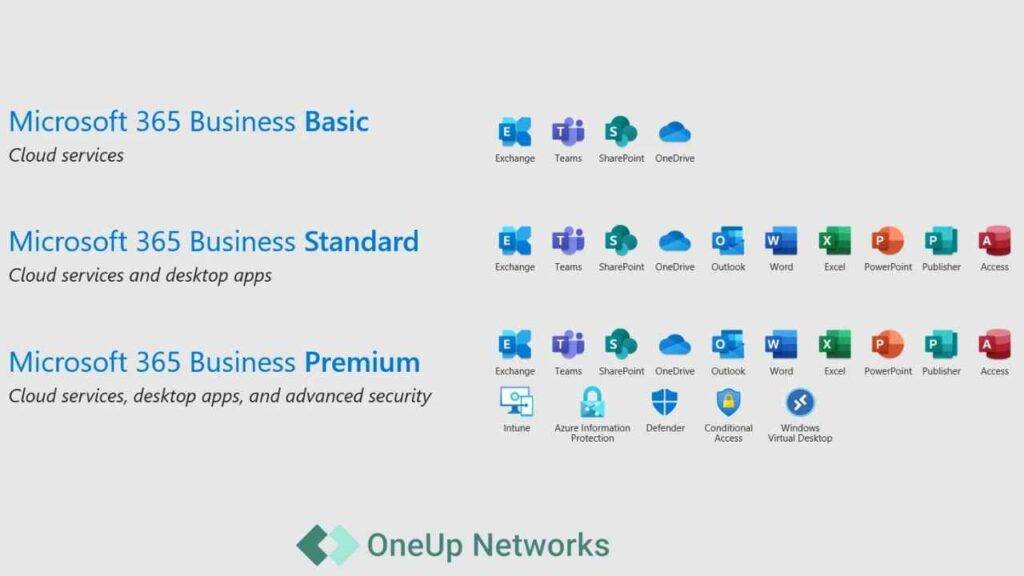
Office 365 Home vs Business: Key Differences
| Feature | Microsoft 365 Home (Family/Personal) | Microsoft 365 Business Standard | Microsoft 365 Business Premium |
|---|---|---|---|
| Users | 1–6 people (flat pricing) | Per user license | Per user license |
| Storage | 1 TB per person | 1 TB per user | 1 TB per user + device control |
| Outlook.com (consumer email) | Business-class Exchange email | Advanced Exchange + compliance | |
| Teams | Consumer version only | Full-featured Teams | Teams with security policies |
| Security | Microsoft Defender basics | Standard security & compliance | Advanced device & data security |
| Price | $69.99–99.99/year | $12.50/user/month | $22/user/month |
Pros and Cons Table
| Plan | Pros | Cons |
|---|---|---|
| Microsoft 365 Home | – Affordable pricing – Up to 6 users per subscription (Family plan) – Full desktop apps with 1 TB storage per user | – No professional business email – No SharePoint or advanced Teams – Limited security features |
| Microsoft 365 Business Standard | – Custom business email (Exchange) – Includes Teams, SharePoint, OneDrive for Business – Scales well with team size | – Per-user licensing increases cost as team grows – Limited advanced security compared to Premium |
| Microsoft 365 Business Premium | – Enterprise-grade security with Intune and advanced controls – Full business suite with device management – Ideal for compliance-heavy industries | – Higher price point – May be too advanced and costly for very small businesses or solo professionals |
Microsoft 365 Home vs Business: Affordability and Professional Features
This comprehensive summary highlights how Microsoft 365 Home plans focus on affordability and family use, while Business plans provide professional tools and advanced security to support growing organizations.
| Feature | Microsoft 365 Home (Personal/Family) | Microsoft 365 Business Standard | Microsoft 365 Business Premium |
|---|---|---|---|
| Users | 1 to 6 users (shared subscription) | Per user license (minimum 1) | Per user license (minimum 1) |
| Desktop Apps | Word, Excel, PowerPoint, Outlook, OneNote | Full Office apps + Access and Publisher | All Business Standard apps + advanced controls |
| Cloud Storage | 1 TB OneDrive per user | 1 TB OneDrive for Business per user | 1 TB OneDrive for Business + device management |
| Consumer Outlook.com email | Custom domain business email (Exchange) | Business email with advanced security (Exchange) | |
| Teams | Consumer Teams version | Full Teams business version | Teams with security and compliance policies |
| Collaboration Tools | Limited (no SharePoint) | SharePoint Online + OneDrive | SharePoint Online + OneDrive + enhanced security |
| Security Features | Basic Microsoft Defender | Standard security & compliance | Advanced security: Intune, threat protection |
| Pricing (2025) | $69.99/year (Personal); $99.99/year (Family) | $12.50/user/month (annual commitment) | $22/user/month (annual commitment) |
| Ideal For | Individuals, families, home users | Small & medium businesses, startups | Businesses requiring advanced security & compliance |
Pricing and Licensing
- Home Plans → One flat subscription, shared among 1–6 people.
- Business Plans → Licensed per user, billed monthly or annually.
Example:
- A family of 5 → Microsoft 365 Family at $99.99/year is cost-effective.
- A business with 5 employees → Microsoft 365 Business Standard at $12.50 × 5 = $62.50/month.
Which Plan Should You Choose?
- Students & Families: Microsoft 365 Personal or Family is the best value.
- Freelancers: Home plan works unless you need a professional business email → then Business Standard is better.
- Small Businesses (1–300 employees): Business Standard balances cost and productivity features.
- Highly Regulated Sectors (finance, healthcare, law): Business Premium provides the necessary compliance and security.
- Remote Teams: Business Standard or Premium for Teams, Exchange, and SharePoint.
Security and Collaboration Features
- OneDrive: 1 TB per user, cloud storage for documents and file sharing.
- Microsoft Teams: Consumer vs Business-level functionality (chat, meetings, business-grade integration).
- Exchange: Business email hosting with custom domains.
- SharePoint: Internal collaboration, document libraries, intranet support.
- Business Premium Security: Device management, conditional access, ransomware prevention.
Alternatives: Office 365 vs Google Workspace
Before deciding, many SMBs evaluate Google Workspace against Office 365 for Business.
- Microsoft 365 strengths: Full-featured desktop apps, rich Teams collaboration, advanced business security.
- Google Workspace strengths: Cloud-first simplicity, easy adoption for startups, slightly cheaper at entry points.
For most established SMBs, Office 365 Business offers a more complete productivity and collaboration experience.
Key Takeaways
- Microsoft 365 Home (Personal/Family) is best for personal and family use.
- Microsoft 365 Business Standard is ideal for small to medium businesses needing professional email and Teams.
- Microsoft 365 Business Premium is designed for organizations with advanced security and compliance needs.
- Business plans are licensed per user, while Home plans use flat family-style pricing.
FAQs on Office 365 Home vs Business
Yes. Microsoft 365 Personal is essentially the rebranded version of Office 365 Home for individual users.
You can, but Home subscriptions lack proper business email, full Teams functionality, and compliance tools.
Business Standard includes core apps, Teams, and Exchange. Premium adds Intune, device management, and advanced security.
Business Standard is typically the best value for SMBs, offering professional-grade tools without Premium’s added security overhead.
Yes, all Business plans include full Teams and Exchange email hosting.
Yes, upgrades are possible but may require migration. IT support (such as OneUpNetworks) can assist with transitions.
Conclusion
Choosing between Microsoft 365 Home and Business comes down to your goals. If you’re an individual, student, or family, the Home plan offers affordable access to the essential productivity tools you use every day. For freelancers and growing businesses, Business Standard provides professional email, advanced collaboration, and scalability. And for organizations in regulated industries, Business Premium adds the compliance and security needed to protect sensitive data.
At the end of the day, the right plan isn’t just about apps — it’s about supporting how you work, collaborate, and grow. With the right Microsoft 365 subscription, you can build a secure, productive foundation for the future.
Drive growth, secure your data, streamline operations — all with OneUp Networks.
We specialize in an end-to-end suite of cloud and IT services tailored to your needs — from industry-leading CPA, QuickBooks, Sage, Wolters Kluwer, Thomson Reuters, Fishbowl, and tax application hosting, to managed IT, backup services, cybersecurity & compliance, virtual desktop infrastructure (VDI), and IT consulting. Whether you’re migrating to the cloud, boosting team productivity, or safeguarding sensitive workflows, our expert team has you covered.
Contact OneUp Networks today — let’s architect a secure, scalable, and customized IT solution that works for you.
Also Read These Helpful Blogs:
- Quickbooks Hosting
- Managed Service Provider (MSP)! FAQs to Make Complexity Simple!
- How WeTransfer Revolutionized File Sharing: Features, Benefits & Tips
- Common Email Threats – Why CPA & Accounting Firms Need Managed Security Services
- UltraTax Virtual Office CS Downtime Fixes: Key Strategies for Tax Professionals

